MercoPress. South Atlantic News Agency
Tag: wheat
-
Friday, December 30th 2022 - 09:57 UTC
Argentina wheat exports at their lowest, but record year for fertilizer consumption
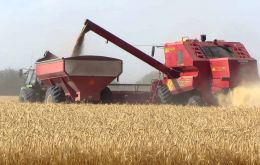
Bad and good news from Argentina. Wheat exports are expected to hit their lowest point in eight years because of climate effects, especially La Niña ravaging the country’s crops for the third consecutive reason, points out the Rosario Grains Exchange (BCR)
-
Wednesday, December 28th 2022 - 09:30 UTC
Argentine wheat crop, one of the least productive in recent history

The Argentine wheat crop, 2022/23 is again suffering the consequences of a prolonged drought and lack of sufficient rain, which means that the overall estimate volume has again been reduced by 300,000 tons to a total of 11,5 million tons, according to the Rosario Grains Exchange.
-
Tuesday, November 22nd 2022 - 09:55 UTC
With Argentine wheat crop failing, Brazil appeals to Russian grain, but it has its problems

A severe drought, followed by several episodes of frost, is expected to reduce Argentine wheat harvest by 40% from initial estimates to around 11/12 million tons, which is expected to have an impact on the Mercosur partner Brazil.
-
Monday, November 14th 2022 - 09:58 UTC
Argentina expected wheat production down drastically because of drought
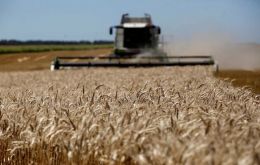
The 2022/23 wheat harvest forecast in Argentina has been cut to 11.8 million tons, down from 13.7 million tons previously, the Rosario grains exchange said in its latest report, warning it could fall further amid a protracted drought that is causing great losses for farmers and foreign currency short Argentina.
-
Tuesday, November 1st 2022 - 10:00 UTC
Argentine drought will force Brazil to purchase wheat in non-Mercosur suppliers
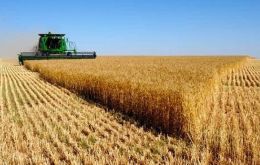
Brazil will need alternative wheat sources because Argentina, its traditional supplier, is facing a serious crop insufficiency as a result of a serious drought that has curtailed production and compromised export volumes. Market analysts expect Brazil will thus have to look for supplies in potential providers such as the United States, Canada and even Russia.
-
Saturday, October 22nd 2022 - 10:15 UTC
Argentina's wheat harvest the worst in seven years caused by climate variability

Argentina's projected wheat harvest, “is in a very critical situation, and could get worse”. announced Rosario grains exchange which cut its 2022/23 harvest forecast to 15 million tons, down from 16 million tons estimated last week
-
Friday, October 7th 2022 - 10:26 UTC
Brazil on a steady path to becoming a wheat exporting country

Brazil forecasts a crop of 10 million tons of wheat this season, up from a previous estimate of 9.67 million, agribusiness consultancy StoneX said on Wednesday, as farmers in the country continued with their harvesting.
-
Tuesday, September 27th 2022 - 09:51 UTC
Brazil expects record harvest of wheat and moves closer to self sufficiency
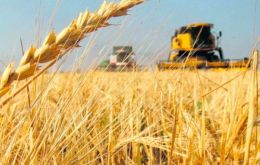
The Brazilian wheat crop should reach 10.935 million tons as 2022 yields in four states are likely to increase output in what will be a record harvest for local farmers.
-
Tuesday, August 30th 2022 - 10:13 UTC
Brazil to become wheat self sufficient in five years, planting the grain in tropical areas

Brazil will become wheat self sufficient in five years time, according to Celso Luiz Moretti, head of EMBRAPA, the Brazilian agriculture surveys and research center, which has helped the country become one of the world's leading food producer and exporter.
-
Saturday, July 30th 2022 - 09:06 UTC
Despite the political upheaval, Argentine farmers are expecting plentiful corn and wheat crops
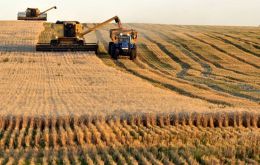
Despite the political upheaval in Argentina, which seems to have temporarily quietened, whether preparing for an even worse storm, or heading for a reasonable path of rationality yet to be seen, the country one of the world's most efficient breadbasket, is again managing extraordinary crops of corn and wheat.
